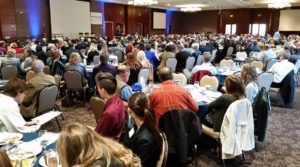 “What a crappy recovery this has been!” exclaimed economist Elliot Pollock at the 41st Annual Economic Outlook Conference in Flagstaff last month. The conference’s reputation for dicey –and humorous – interactions between economic experts packed the house at the High Country Conference Center.
“What a crappy recovery this has been!” exclaimed economist Elliot Pollock at the 41st Annual Economic Outlook Conference in Flagstaff last month. The conference’s reputation for dicey –and humorous – interactions between economic experts packed the house at the High Country Conference Center.
“This recovery is getting old – 88 months old,” said the expert. As if not wanting to complain without bringing some solutions to the table, the economist spelled out five ways to spur the economy: lower tax rates, lessen regulation, limit legislation that creates quasi-monopolies, reduce barriers to international trade and decrease barriers to credit creation.
“Trump could make a huge positive difference,” concluded Pollock, CEO of Elliot D. Pollack and Company. According to Pollock, Trump’s plan includes lowering taxes, massive infrastructure spending and opening oil, gas and coal.
Pollock warned that international trade is the biggest problem with the President-elect’s plan. “It’s time to be cautious because the recovery is getting older,” said Pollock, one of the economists presenting at the sold-out symposium hosted by the W.A. Franke College of Business and the Alliance Bank Business Outreach Center, and sponsored by Alliance Bank.
“Economic growth has been poor,” asserted Dennis Foster, Ph.D., of Northern Arizona University, pointing to the current national recovery rate of 2.05 percent. “The interest rate is at historic lows, but bank reserves are increasing. The only good news is that inflation, as measured by CPI [Consumer Price Index], has been low.”
Foster, senior lecturer of Economics at FCB, presented the outlook for interest rates and inflation. He noted that the tremendous excess bank reserves remain a threat because increased lending will stimulate some production and could result in serious inflation. Foster projected little or no change in interest rates over the next six months to a year, and that inflation will start creeping up.
Foster suggested that spurring economic growth without causing inflation will be one of the challenges for the Trump presidency. He predicted that Trump will spur growth by “reducing the burdens of regulation and shifting government programs to the market.” Another challenge will be diminishing the threat of inflation without triggering recession. Foster suggested that Trump try to convince the Fed to undo the effects of their “Quantitative Easing” programs.
Ronald J. Gunderson, Ph.D., a professor of economics at NAU, addressed local versus national outlooks. He noted that the seven recessions since 1970 were preceded by negative Real Gross Domestic Investment (RGDI). (RGDI is the amount of private business capital invested in domestic production either through the purchase of fixed property or inventory.) “We’re at a negative now; if we’re not careful, there could be a recession. Politics is not behind it; it’s simple economics,” he said.
According to Gunderson, Flagstaff and other localities around the nation hold unique positions and “still can experience considerable growth even if the nation’s economy is lagging. These local regions are impacted by the national economy, but they also experience lives of their own.”
Optimistic about the condition of the local economy, Gunderson pointed out indicators such as Flagstaff’s current building boom that includes developments at Country Club Drive, McMillan Mesa, Village at the Mall, Trax on East Route 66 and downtown. Other indicators that he included were increased number of jobs, higher paying jobs, growth in the high-tech and medical industry, slow steady increase in tourism and increased enrollment and activities at NAU. But he warned, “There are issues of real concern.” The analyst listed those concerns as traffic congestion, higher cost-of-living and the new minimum wage.
“From an economic perspective, there are negative influences of increasing the minimum wage,” the professor stated. “Studies show that the number of jobs go down. When jobs are lost, the services are gone for everyone. Labor costs increase and increase the cost of everything.… Most economists admit that there are better ways to address this.”
The recent increase in Flagstaff’s minimum wage came up again later during the Speaker Panel Discussion that preceded the keynote address by financial analyst Morgan Housel of The Motley Fool and The Collaborative Fund. “In a market-based economy, artificially inflated wages result in four things: lost jobs, lower profit, price is passed onto the consumer, or workers work [fewer] hours,” Pollock detailed. He predicted that the next recession will exacerbate some of those problems, making it harder for beginning workers to get started.
“It is not an effective way to tackle the problem,” said Pollock. “Winston Churchill said, ‘Trust the Americans to do the right thing – once they’ve tried everything else.’ We have to keep trying something else.” After some bantering, Foster and Gunderson concurred that Flagstaff’s increased minimum wage was not positive for local economic growth.
“For the first time, we have three economists that agree,” grinned Dr. Craig Van Slyke, dean of W.A. Franke College of Business, who moderated the panel discussion. FBN
By Stacey Wittig, FBN
Alliance Bank of Arizona
501 E Butler Avenue
Flagstaff, AZ 86001
928-214-3400
westernalliancebancorporation.com/alliance-bank-of-arizona-home
Elliott D. Pollack and Company
7505 East 6th Avenue, Suite 100
Scottsdale, AZ 85251
480-423-9200
Northern Arizona University
W.A. Franke College of Business
101 E McConnell Drive
Flagstaff, AZ 86001
928-523-5232







